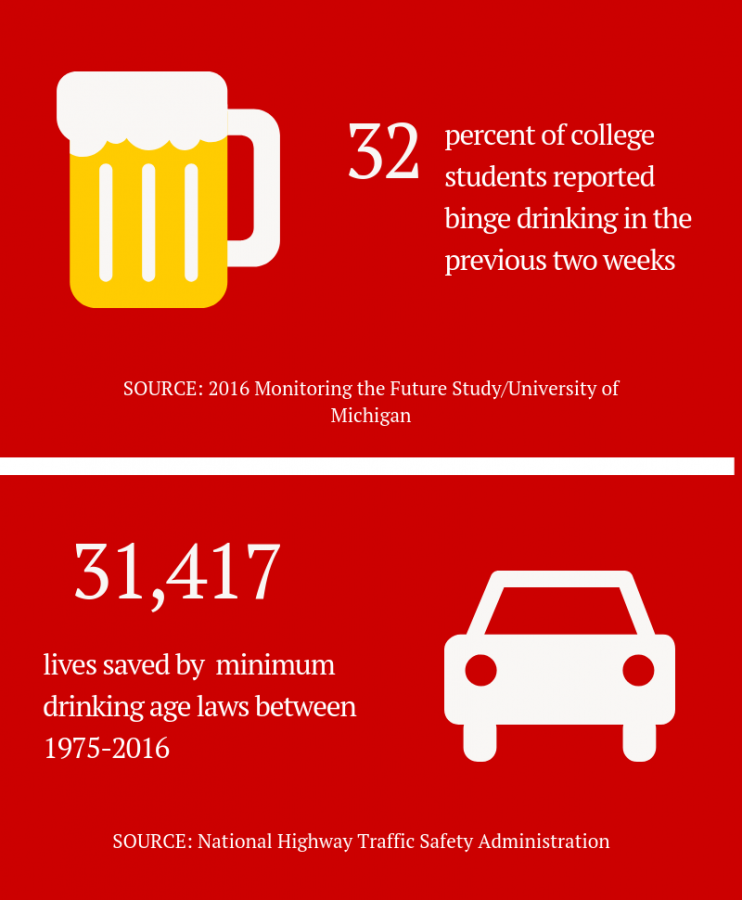
Several states, including Wisconsin, Louisiana and New Hampshire have considered proposals to lower the drinking age this past year. These proposals are dangerous because of their potential to increase destructive and harmful behaviors among young adults.
The National Minimum Drinking Age Act of 1984 outlawed the purchase of alcohol by anyone under the age of 21. Before the law’s passing, many states had minimum drinking ages of 18 or 19. Under the law, any state that institutes a lower drinking age will have their federal highway funds reduced significantly. For example, the state of Louisiana risked losing 10 percent of their federal highway funds after lowering their drinking age to 18 in 1996.
College-age people would be the primary group affected by a change to the minimum drinking age. Currently, most college students must wait until their junior or senior years to legally purchase alcohol. However, the minimum drinking age law does not deter a large amount of underage people from consuming alcohol. According to the 2017 National Survey on Drug Use and Health, about 20 percent of Americans between the ages of 12 and 20 reported drinking alcohol in the past month.
College students are also at a uniquely high risk of developing unhealthy drinking habits. Slightly more than 30 percent of college students reported binge drinking in the previous two weeks, according to the 2016 Monitoring the Future Study. In the survey, binge drinking was defined as consuming five or more drinks in a row at least once in a two-week period.
A primary argument in favor of reducing the minimum legal drinking age is to prevent young people’s view of drinking alcohol as a rebellious activity. If they were able to consume alcohol at a younger age, such as 18, they could have their first legal drink while still living with their parents. This might limit the risk that students will binge drink in college, as alcohol will no longer have a forbidden fruit appeal.
However, new research from University of Wisconsin-Madison professor Jason Fletcher discredits the argument in favor of parental supervision over initial legal alcohol consumption. Surprisingly, Fletcher’s research found that young adults living with their parents are at a higher risk to participate in alcohol-related risky behavior than young people living away from home.
Fletcher’s research also expanded upon negative effects that lowering the legal drinking age may have. After turning 21, men are more likely to drive drunk, get in fights and engage in risky sexual behavior. Lowering the drinking age might increase the prevalence of these behaviors, as young men are likely even more prone to irresponsible actions at 18 or 19 years old.
Drunk driving is an especially dangerous activity for young people. Minimum age drinking laws have been effective at limiting its danger. Between 1975 – 2016, minimum drinking age laws saved more than 30,000 lives, according to the National Highway Traffic Safety Administration.
A lower drinking age could also have negative health effects since adolescence is a key period for brain development. The hippocampus is a part of the brain that plays a major role in memory development. According to research from the University of California-San Diego, volumes of the hippocampus were significantly smaller in adolescents with alcohol use problems, potentially leading to memory problems.
One of the authors of the recent drinking age proposal in Wisconsin is Wisconsin State Assembly Representative Adam Jarchow. In an interview with WMTV, Jarchow said “I see no reason why we can send young men and women off to war but they can’t have a beer.”
However, less than 0.5 percent of the US population were active duty military members in 2016, according to the Council on Foreign Relations. About 10 percent of active duty military members were between 17-19 years old. Lowering the drinking age so young military members can have a beer would be a drastic change to appeal to a small percentage of the population.
The current minimum drinking age saves lives and protects people from dangerous behavior. Instead of lowering the drinking age, lawmakers should work toward raising awareness of the negative health and safety effects that drinking has on young adults.
